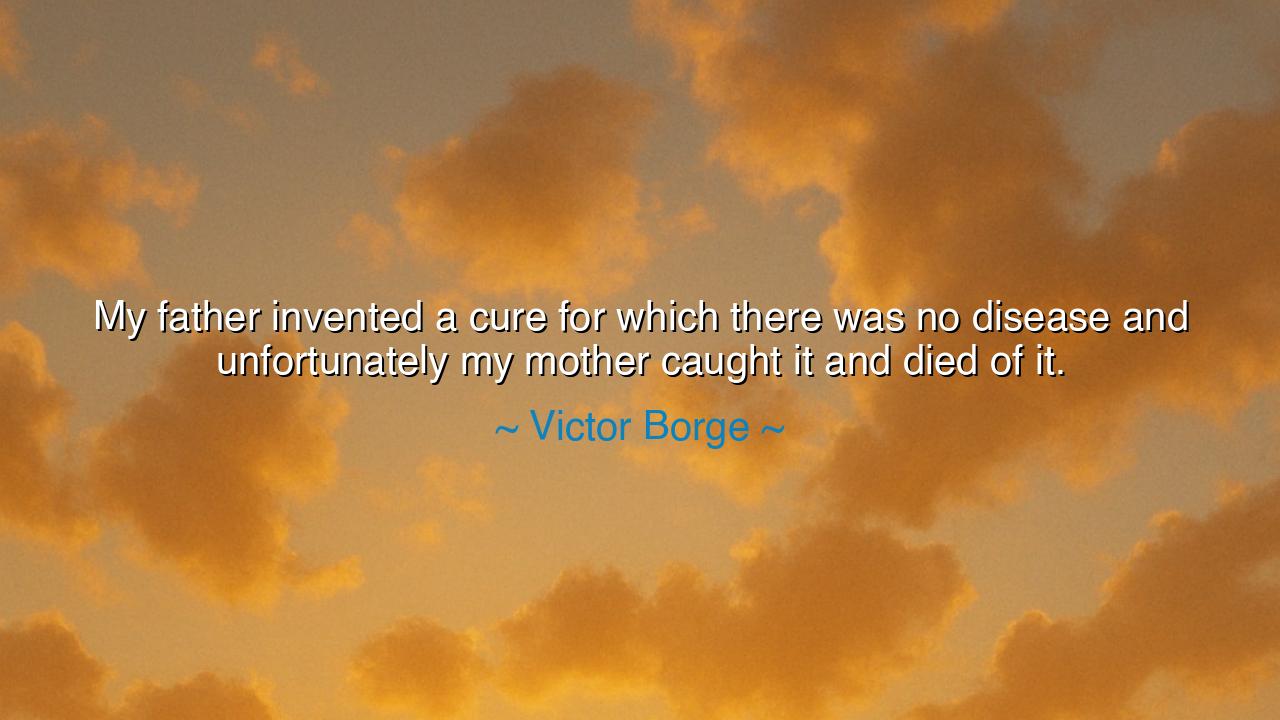
My father invented a cure for which there was no disease and
My father invented a cure for which there was no disease and unfortunately my mother caught it and died of it.






Hear the words of Victor Borge, the master of wit and melody, who once said: “My father invented a cure for which there was no disease, and unfortunately my mother caught it and died of it.” At first, the saying may draw laughter, for it bears the playfulness of a jester’s tongue. Yet beneath its humor lies the hidden gold of wisdom — the bittersweet truth that human cleverness, when detached from purpose or humility, can become folly. For what is a cure without a disease, if not the fruit of a mind too enamored with invention to remember meaning? And what is laughter, if not the medicine by which the wise teach painful truths to those who will not hear them otherwise?
The origin of these words rests in Borge’s art — a man who stood between the realms of music and comedy, blending both to reveal the contradictions of the human heart. Born in Denmark and shaped by exile during the fires of war, Victor Borge learned that laughter was not denial, but resilience. His humor was the armor of a survivor and the tool of a philosopher. When he spoke this line, he was not mocking his parents, but the eternal irony of humankind — that we create solutions to problems that never existed, and in doing so, sometimes destroy what is most precious. His jest becomes a mirror: it shows us how pride, unbalanced by wisdom, can turn creation into tragedy.
Throughout history, we have seen many such “cures without diseases.” The alchemists of old sought to conquer death by distilling eternal life, yet many perished in their own experiments. The inventors of war sought peace through might, only to birth ruin through their ambition. Even in our own age, men and women craft devices of convenience that steal their time, or medicines that heal the body but dull the soul. In each of these, the spirit of Borge’s irony lives: that progress, unguided by purpose, becomes its own affliction. The mind must be tempered by heart, or it will create cleverness without compassion — a cure that sickens.
And yet, there is tenderness, too, in this saying. For in it, Borge speaks not only of intellect and irony, but of love — the love between father and mother, creation and consequence. His words are a small tragedy wrapped in humor, as though he were saying: “Even our best intentions can wound those dearest to us.” His father’s cure, born of innovation, becomes a symbol of all human effort that overreaches. His mother’s death, a symbol of innocence touched by unintended harm. But the laughter with which he delivers the story redeems it — for laughter is how love forgives folly, and how wisdom turns pain into understanding.
The ancients, too, knew this duality. The Greeks spoke of hubris — the pride that drives man to challenge the gods, to create what should not be created. Icarus, flying on wings of wax, soared too high and perished for his father’s ingenuity. Like Borge’s father, Daedalus was both genius and fool — a man whose creation was magnificent but flawed by its very daring. And like Borge’s mother, Icarus “caught” his father’s invention and died of it. Thus, the story repeats across time: the brilliance of man forever shadowed by his blindness to consequence.
Yet from such folly comes learning. Victor Borge, through his jest, teaches us to temper our ambition with humility, and our intellect with kindness. To ask not only “Can we?” but “Should we?” before we act. His humor is the soft voice of wisdom, reminding us that progress without purpose is a path paved with unintended sorrow. True healing — the only real cure — lies not in invention for its own sake, but in creation guided by love, empathy, and awareness.
Let this then be the lesson, O listener of the ages: laugh, but also reflect. In every jest, find the truth that hides beneath the smile. When you build, build for good. When you discover, seek to heal, not merely to impress. Beware the cleverness that forgets compassion, the cure that forgets the disease, the achievement that forgets the soul. For laughter may forgive folly, but wisdom prevents it.
So, as Victor Borge stood before his audiences, blending comedy and truth, so must we learn to live — with humor that enlightens, and with intellect that humbles. Laugh at the absurdities of human nature, yes, but let that laughter lead to kindness. For in the end, every invention, every act, every word must serve life, not vanity. Only then will we escape the fate of Borge’s father — creators of cures for the wrong ills — and instead become healers of the heart, makers of joy, and keepers of wisdom.






AAdministratorAdministrator
Welcome, honored guests. Please leave a comment, we will respond soon